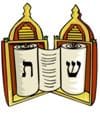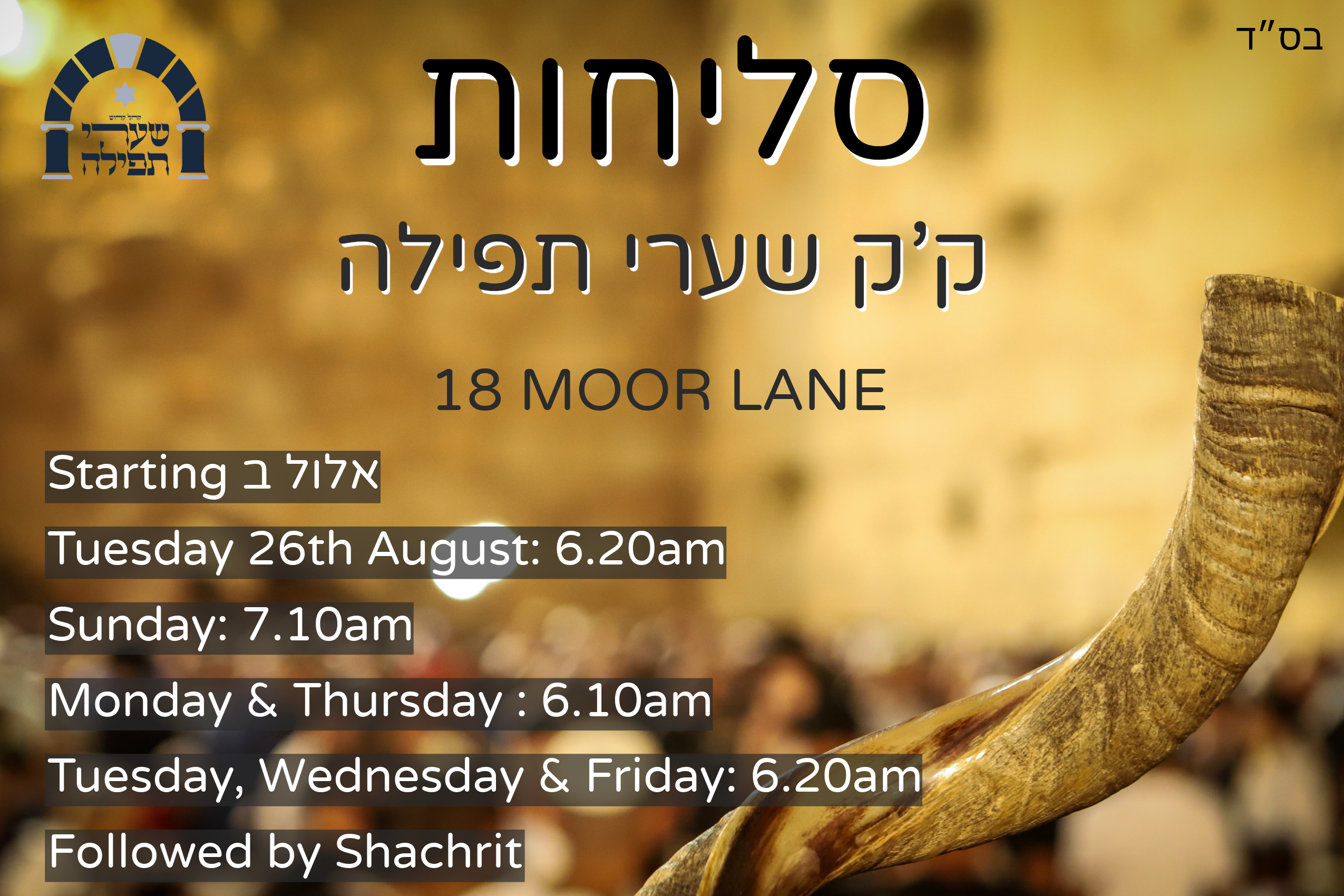


*********
Moor Lane Women’s Nach Group



Pledge Reminder
There is a big segula to pay any debts before Rosh Hashana,
so we'd like to remind members and friends of the Bet Hakeneset
that if you have pledged
a donation to the Bet Hakeneset
after receiving an Aliya in the last few weeks,
the pledge can be fulfilled in any of the following ways:
· By post addressed to
'The Treasurer, Manchester Congregation of Spanish and Portuguese Jews,
18 Moor Lane, Salford, Manchester M7 3WX'.
· By hand to the treasurer or any member of the Mahamad.
·Anonymously – in the donations box in the Synagogue.
·Direct Debit to the shul's account – for account details please speak to the treasurer
· Using this link charityextra.com/charity/moorlane
·Cheque made payable to 'Manchester Congregation of Spanish & Portuguese Jews'.
Thank you & Tizke Lemitzvot


לוח זמני תפלה לקיץ תשפ״ה
Summer Timetable 5785 – 2025
מוצאי שבת | ערבית )מוצ”ש( | שקיעה | סוף זמן קראת שמע | זמן שבת | פלג מנחה (תה״ד) | פלג מנחה (לבוש) | מנחה וקבלת שבת | תאריך | שבת פרשת |
Shabbat Ends | Arbit | Sunset | Shema to be read before | Candles to be |
| Earliest Candle lighting | Minha & Kabbalat Shabbat* | Date | Parasha |
PM | PM | PM | AM | PM | PM | PM | PM |
|
|
8:01 | 7:57 | 7:11 | 9:56 | 6:59 | 6:27 | 5:57 | 6:59 | 19/20 Sep | נצבים |
🕯️SUMMER TIMES FOR SHABBAT 🕯️
שבת
קרבנות
9:00 am
הודו
9:15 am
מנחה
6:30 pm
********
On the last day of his life, Moshe gathers all the people, young and old, lowly and exalted, men and women, in a final initiation. The covenant includes not only those who are present, but even those generations yet unborn. Moshe admonishes the people again to be extremely vigilant against idol worship, because despite having witnessed the abominations of Egypt, there will always be the temptation to experiment with foreign philosophies as a pretext for immorality.
Moshe describes the desolation of the Land of Israel that will result from failure to heed Hashem’s mitzvahs. Both their descendants and foreigners alike will remark on the singular desolation of the Land and its apparent inability to be sown or to produce crops. The conclusion will be apparent to all — that the Jewish People have forsaken the One Who protects them, in favor of powerless idols. Moshe promises, however, that the people will eventually repent after both the blessings and the curses have been fulfilled. And, however assimilated they will have become among the nations, Hashem will eventually bring them back to the Land of Israel. Moshe tells the people to remember that the Torah is not a remote impossibility, but rather that its fulfillment is within the grasp of every Jew. This Torah portion concludes with a dramatic choice between life and death, with Moshe exhorting the people to choose life.
Ohr Somayach Institutions www.ohr.edu

צורת התפילה בראש השנה
שאלה: מה האופן הנכון לנהוג בו בתפלות ראש השנה? האם יש להתעורר ולבכות בשעת התפלה, כדי שה' ירחם עלינו וימלא משאלותינו לטובה? או שאולי נכון יותר להתפלל בשמחה?
ומכאן נראה לכאורה, שלא נכון להצטער ולבכות בתפלות של ראש השנה, שהוא יום שמחה. אלא יש להתפלל בשמחה ובאהבה.
ולכאורה נראה שיש מחלוקת בין רבינו האר”י לבין הגאון מוילנא בענין זה. ובכלל, לכאורה דברי האר”י מוקשים מאד, מפסוקים מפורשים בספר נחמיה.
והוא הדין למתפללים בכוונה בראש השנה, ועיניהם זולגות דמעות מרוב התרגשותם והתלהבותם, שיפה הם עושים. וברור הדבר מאד שרבינו האר”י שהיה עמוד העולם בקבלה האלהית, שר בית הזוהר, וכל רז לא אניס ליה, והיה נאה דורש ונאה מקיים, מרוב דבקותו בה' ובכוונות הקדושות בתפלותיו בימים הנוראים, היה מתעורר בבכיה רבה, והרי זה דומה למעשה של רבי עקיבא הנ”ל.
והוא הדין לכל אדם שבכיה נופלת עליו מאליו בימים הנוראים, על ידי התפלות הקדושות שמעוררות רשפי אש שלהבת יה, שאין בדבר חשש כלל, אבל להביא עצמו לידי בכיה, על ידי קול בכי וכדומה, אין להתיר, וכפי שכתוב בנחמיה. ואף שממשמעות דברי כמה מגדולי האחרונים משמע, שיש לעורר עצמו לבכיה, מכל מקום למעשה אין ראוי לנהוג כן, וכפי שכתבנו.
ולסיכום: אין לבכות בראש השנה. והתפלות של ראש השנה יש לאומרם בשמחה ובנעימה קדושה, ומתוך כוונה רבה, כי תפלה בלא כוונה כגוף בלא נשמה. ומכל מקום אדם שמתעורר מעצמו בבכיה ומתפלל בדמעות שליש, אין בזה שום חשש איסור כלל. ותבוא עליו ברכה. והשי”ת יקבל תפלתינו ברצון ונזכה כולנו יחד עם כל בית ישראל לשנה טובה ומבורכת כתיבה וחתימה טובה.
The Proper Way to Pray on Rosh Hashanah
Question: What is the proper way to behave during the prayers of Rosh Hashanah: Should one arouse himself to cry during the prayers in order for Hashem to pity us and grant us all of our requests or should one pray amid great joy?
Answer:
The Mitzvah to be Glad on Rosh Hashanah
The Poskim deliberate whether or not there is a Mitzvah and obligation to be joyous on Rosh Hashanah just as one must rejoice during the holidays of Pesach, Shavuot, and Sukkot. Halachically speaking, the She’iltot of Rav Achai Gaon (Parashat Chayei Sarah) writes that there is indeed a Mitzvah to be joyous on Rosh Hashanah. Similarly, Rav Sar-Shalom Gaon (quoted by the Rosh, Chapter 4, Rosh Hashanah) rules that the Mitzvah of be joyous applies to the holiday of Rosh Hashanah as well. It is therefore forbidden to fast on Rosh Hashanah. The Rashba (in Volume 4 of his Responsa, Chapter 262) likewise quotes Rav Hai Gaon who rules that it is forbidden to fast on Rosh Hashanah, for regarding this holiday the verse in the Book of Nechemia states, “Go and eat fatty foods and drink sweet beverages.”
Rosh Hashanah is Designated for Prayer and Supplication
Nevertheless, a majority of the days of Rosh Hashanah is dedicated to prayer and supplication to Hashem. Indeed, Rabbeinu Yitzchak be Ge’at writes in his Sefer Me’ah She’arim (page 44) that one may not fast on Rosh Hashanah, for although our Sages expounded the verse “Seek Hashem when He is present” as referring to the Ten Days of Repentance, they did mean to establish these days as days of fasting; rather, these days are designated for prayer and supplication. These days are indeed called “Days of Repentance” and not “Days of Fasting.” One should therefore not fast on Rosh Hashanah, for one may not rebuff the obligation to rejoice on Yom Tov. Other Rishonim write likewise.
It would seem from here that one should not feel sorrow or cry during the prayers of Rosh Hashanah, for Rosh Hashanah is a day of joy. Rather, one should pray joyfully and out of love.
The Opinion of Rabbeinu Ha’Ari z”l
On the other hand, Rabbeinu Chaim Vital (chief disciple of the saintly Ari z”l) attests in his Sha’ar Ha’Kavanot (page 90) that the great Rabbeinu Ha’Ari would cry copiously during the prayers of Rosh Hashanah. He would say that if one was not overcome by weeping during these days, it is an indication that this individual’s soul is incomplete and unrefined. Many great Acharonim quote his words.
The Opinion of the Vilna Gaon
Nevertheless, the Sefer Ma’aseh Rav (a book detailing the practices of Hagaon Rabbeinu Eliyahu of Vilna) writes in the name of the Vilna Gaon that one should not cry on Rosh Hashanah, for the verse in Nechemia states that after the entire nation began to weep, Ezra the Scribe and Nechemia told them, “This day is holy to Hashem your G-d, do not mourn and do not cry etc. Go and eat fatty foods, drink sweet beverages, and send portions to those who do not have, for the day is sanctified for our Lord; do not be saddened, for the gladness of Hashem is your fortress.” The Gaon of Vilna would thus make sure that the Chazzan would chant the Kaddish in a tune in honor of Yom Tov.
It would seem that a disagreement exists between the saintly Ari z”l and the Vilna Gaon regarding this matter. It is even more difficult to understand, for it would seem that Rabbeinu Ha’Ari’s opinion is in direct contradiction with an explicit verse in the Book of Nechemia!
The Opinion of Maran Rabbeinu Ovadia Yosef zt”l
Maran Rabbeinu Ovadia Yosef zt”l writes (in his Responsa Yabia Omer, Volume 1, Chapter 36, Volume 9, Chapter 51, Responsa Yechave Da’at, Volume 2, Chapter 69, and Chazon Ovadia-Yamim Nora’im, page 87) that there is actually no disagreement here and all opinions agree that although one should not consciously cause himself to be sad and cry due to the sanctity of the day, nevertheless, if one happens to be aroused during the Rosh Hashanah prayers and begins to cry on his own as a result of holy excitement, his cleaving to Hashem, and his concentration on the prayers of the Days of Awe (a feeling similar to becoming emotional in a sanctified manner), this is not forbidden at all. Similarly, the Turei Zahav (Orach Chaim, Chapter 283, Subsection 2) writes that the Midrash states that once, Rabbi Akiva’s students found Rabbi Akiva reading Shir Ha’Shirim (Song of Songs) while crying on Shabbat. He told them that although it is forbidden to cry on Shabbat, as the verse states, “And you shall call the Shabbat a delight,” nevertheless, since crying was a delight for him, it was permissible. The Turei Zahav explains that because Rabbi Akiva was so close to Hashem, when he would read Shir Ha’Shirim, he would understand with his great and holy wisdom how deep the concepts contained in the holy scripture really were and this would cause his eyes to tear. A similar idea can be found by righteous Torah scholars who pray fervently. Indeed, we have seen several times that when Maran zt”l would read the moving verses of the Nevi’im in the weekly Haftara portion, he would usually begin to cry, even on Shabbat, as a result of his great emotion and love of Hashem (Maran zt”l deals with matter lengthily in his various works).
The same applies to those praying fervently on Rosh Hashanah at which point their eyes begin to tear and they begin to cry; this is indeed a fine custom. Clearly, the saintly Ari z”l, to whom all of the secrets of the Torah were open and revealed, was on this lofty level where, as a result of his saintly emotions and holy concentration during the prayers of Rosh Hashanah, he would begin to weep copiously similar to the above incident concerning Rabbi Akiva.
Indeed, the same applies to any individual who becomes uplifted and, as a result, begins to cry on his own during the holy and intense prayers of the Days of Awe and there is nothing wrong with this at all. However, one may not bring himself to cry by beginning to recite the prayer in a wailing tune and the like, as the verse in Nechemia clearly states. Although it seems from some great Acharonim that one should cause himself to cry, halachically speaking, one should not behave this way.
Summary: One may not cry on Rosh Hashanah. One should recite the Rosh Hashanah prayers amid much joy, pleasantness, and great concentration, for prayer without concentration is like a body without a soul. Nevertheless, if one is uplifted to a point where he begins to cry on his own during the Rosh Hashanah prayers, there is no prohibition involved in doing so. May Hashem accept our prayers graciously and may we and the entire Jewish nation merit a good and sweet new year and may we all be inscribed and sealed in Hashem’s Book of Life, Amen.